Taxation Law: Personal Income, Deductions, and Cooke & Sherden Case
VerifiedAdded on 2023/04/25
|9
|1821
|73
Case Study
AI Summary
This case study delves into various aspects of taxation law, starting with the assessment of Jane's personal service income, including salary, bonuses, allowances, and awards, alongside deductible expenses. It applies relevant sections of the ITAA 1997 and ITAA 1936 to determine taxable income and allowable deductions, such as donations and business-related expenses. The study also addresses the tax treatment of franked dividends, capital gains/losses, and the application of earnings vs. receipts methods for business income. Furthermore, the case study analyzes the landmark FCT v Cooke and Sherden (1980) case, focusing on the principle that non-convertible, non-cash benefits are not considered ordinary income, referencing similar cases like Payne v FCT (1996). Desklib provides a platform for students to access this and other solved assignments for academic support.
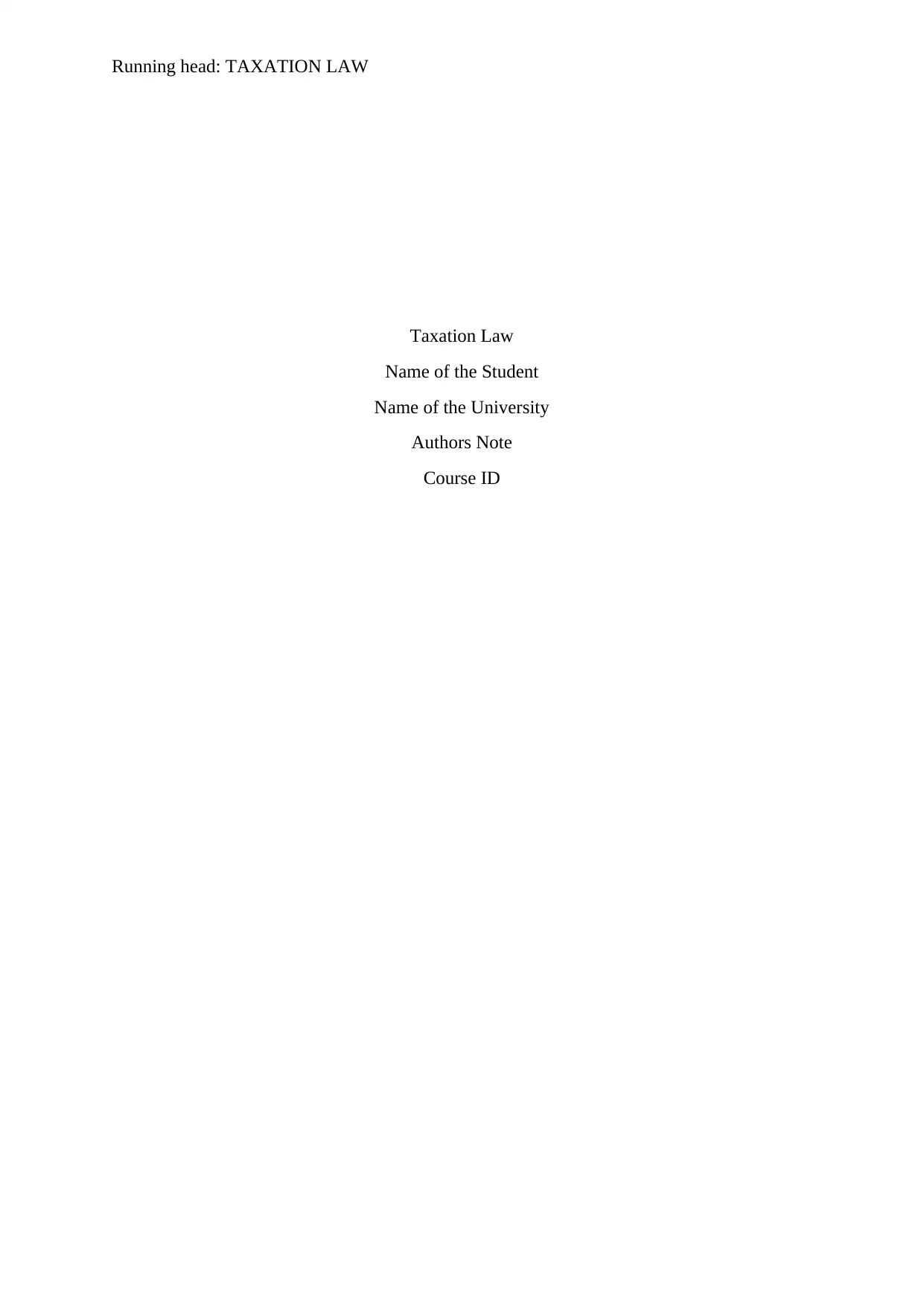
Running head: TAXATION LAW
Taxation Law
Name of the Student
Name of the University
Authors Note
Course ID
Taxation Law
Name of the Student
Name of the University
Authors Note
Course ID
Paraphrase This Document
Need a fresh take? Get an instant paraphrase of this document with our AI Paraphraser
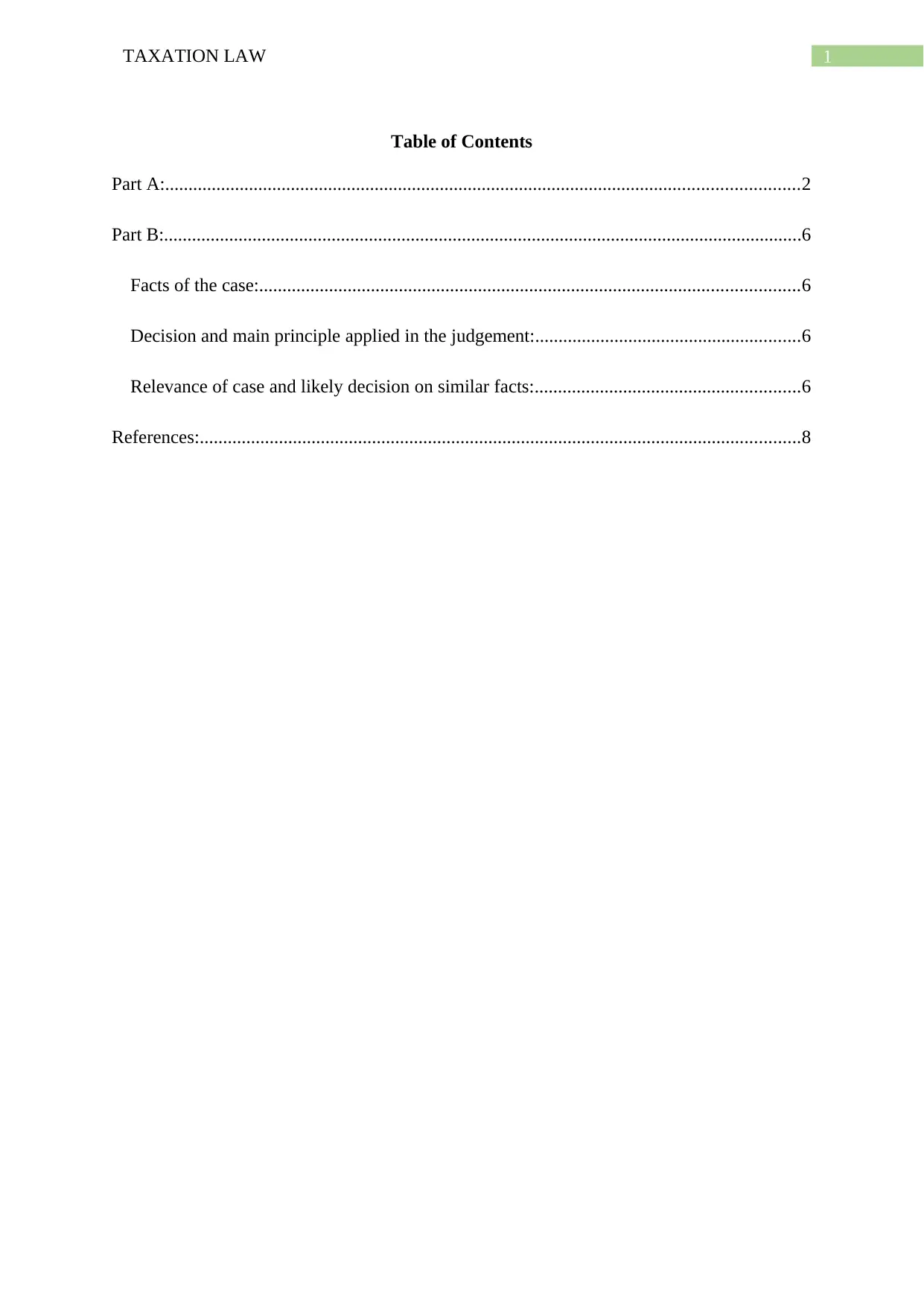
1TAXATION LAW
Table of Contents
Part A:........................................................................................................................................2
Part B:.........................................................................................................................................6
Facts of the case:....................................................................................................................6
Decision and main principle applied in the judgement:.........................................................6
Relevance of case and likely decision on similar facts:.........................................................6
References:.................................................................................................................................8
Table of Contents
Part A:........................................................................................................................................2
Part B:.........................................................................................................................................6
Facts of the case:....................................................................................................................6
Decision and main principle applied in the judgement:.........................................................6
Relevance of case and likely decision on similar facts:.........................................................6
References:.................................................................................................................................8
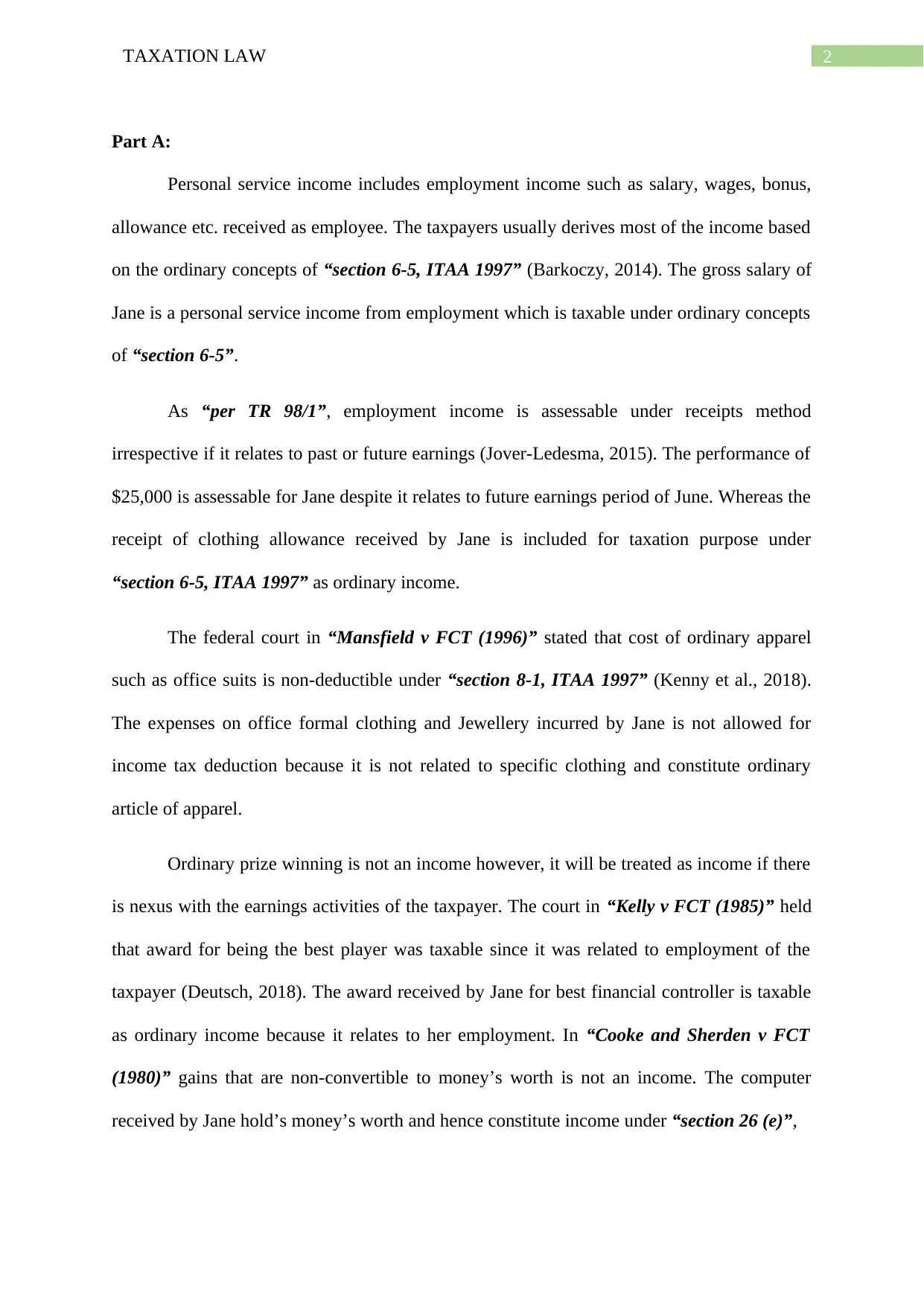
2TAXATION LAW
Part A:
Personal service income includes employment income such as salary, wages, bonus,
allowance etc. received as employee. The taxpayers usually derives most of the income based
on the ordinary concepts of “section 6-5, ITAA 1997” (Barkoczy, 2014). The gross salary of
Jane is a personal service income from employment which is taxable under ordinary concepts
of “section 6-5”.
As “per TR 98/1”, employment income is assessable under receipts method
irrespective if it relates to past or future earnings (Jover-Ledesma, 2015). The performance of
$25,000 is assessable for Jane despite it relates to future earnings period of June. Whereas the
receipt of clothing allowance received by Jane is included for taxation purpose under
“section 6-5, ITAA 1997” as ordinary income.
The federal court in “Mansfield v FCT (1996)” stated that cost of ordinary apparel
such as office suits is non-deductible under “section 8-1, ITAA 1997” (Kenny et al., 2018).
The expenses on office formal clothing and Jewellery incurred by Jane is not allowed for
income tax deduction because it is not related to specific clothing and constitute ordinary
article of apparel.
Ordinary prize winning is not an income however, it will be treated as income if there
is nexus with the earnings activities of the taxpayer. The court in “Kelly v FCT (1985)” held
that award for being the best player was taxable since it was related to employment of the
taxpayer (Deutsch, 2018). The award received by Jane for best financial controller is taxable
as ordinary income because it relates to her employment. In “Cooke and Sherden v FCT
(1980)” gains that are non-convertible to money’s worth is not an income. The computer
received by Jane hold’s money’s worth and hence constitute income under “section 26 (e)”,
Part A:
Personal service income includes employment income such as salary, wages, bonus,
allowance etc. received as employee. The taxpayers usually derives most of the income based
on the ordinary concepts of “section 6-5, ITAA 1997” (Barkoczy, 2014). The gross salary of
Jane is a personal service income from employment which is taxable under ordinary concepts
of “section 6-5”.
As “per TR 98/1”, employment income is assessable under receipts method
irrespective if it relates to past or future earnings (Jover-Ledesma, 2015). The performance of
$25,000 is assessable for Jane despite it relates to future earnings period of June. Whereas the
receipt of clothing allowance received by Jane is included for taxation purpose under
“section 6-5, ITAA 1997” as ordinary income.
The federal court in “Mansfield v FCT (1996)” stated that cost of ordinary apparel
such as office suits is non-deductible under “section 8-1, ITAA 1997” (Kenny et al., 2018).
The expenses on office formal clothing and Jewellery incurred by Jane is not allowed for
income tax deduction because it is not related to specific clothing and constitute ordinary
article of apparel.
Ordinary prize winning is not an income however, it will be treated as income if there
is nexus with the earnings activities of the taxpayer. The court in “Kelly v FCT (1985)” held
that award for being the best player was taxable since it was related to employment of the
taxpayer (Deutsch, 2018). The award received by Jane for best financial controller is taxable
as ordinary income because it relates to her employment. In “Cooke and Sherden v FCT
(1980)” gains that are non-convertible to money’s worth is not an income. The computer
received by Jane hold’s money’s worth and hence constitute income under “section 26 (e)”,
⊘ This is a preview!⊘
Do you want full access?
Subscribe today to unlock all pages.

Trusted by 1+ million students worldwide
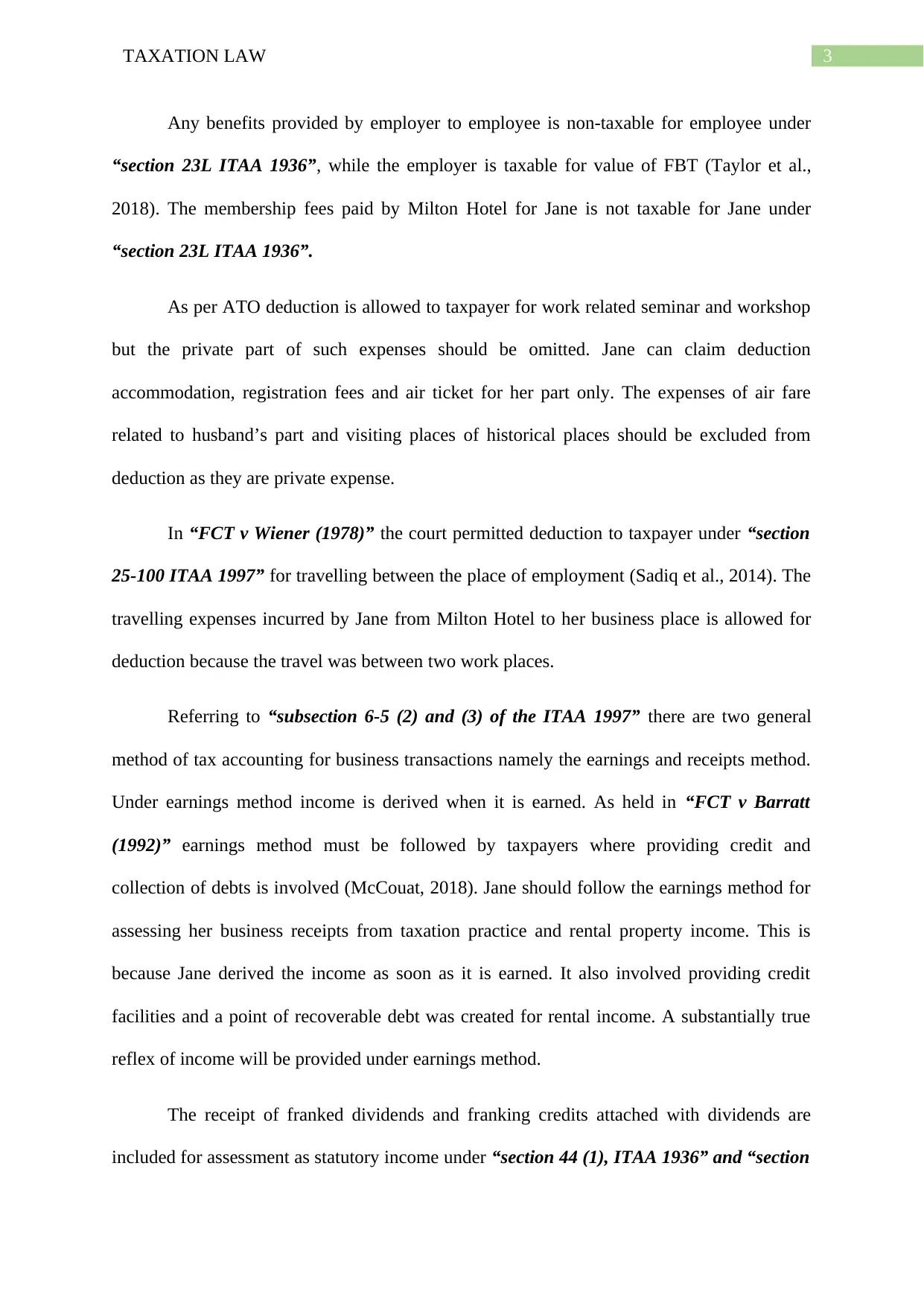
3TAXATION LAW
Any benefits provided by employer to employee is non-taxable for employee under
“section 23L ITAA 1936”, while the employer is taxable for value of FBT (Taylor et al.,
2018). The membership fees paid by Milton Hotel for Jane is not taxable for Jane under
“section 23L ITAA 1936”.
As per ATO deduction is allowed to taxpayer for work related seminar and workshop
but the private part of such expenses should be omitted. Jane can claim deduction
accommodation, registration fees and air ticket for her part only. The expenses of air fare
related to husband’s part and visiting places of historical places should be excluded from
deduction as they are private expense.
In “FCT v Wiener (1978)” the court permitted deduction to taxpayer under “section
25-100 ITAA 1997” for travelling between the place of employment (Sadiq et al., 2014). The
travelling expenses incurred by Jane from Milton Hotel to her business place is allowed for
deduction because the travel was between two work places.
Referring to “subsection 6-5 (2) and (3) of the ITAA 1997” there are two general
method of tax accounting for business transactions namely the earnings and receipts method.
Under earnings method income is derived when it is earned. As held in “FCT v Barratt
(1992)” earnings method must be followed by taxpayers where providing credit and
collection of debts is involved (McCouat, 2018). Jane should follow the earnings method for
assessing her business receipts from taxation practice and rental property income. This is
because Jane derived the income as soon as it is earned. It also involved providing credit
facilities and a point of recoverable debt was created for rental income. A substantially true
reflex of income will be provided under earnings method.
The receipt of franked dividends and franking credits attached with dividends are
included for assessment as statutory income under “section 44 (1), ITAA 1936” and “section
Any benefits provided by employer to employee is non-taxable for employee under
“section 23L ITAA 1936”, while the employer is taxable for value of FBT (Taylor et al.,
2018). The membership fees paid by Milton Hotel for Jane is not taxable for Jane under
“section 23L ITAA 1936”.
As per ATO deduction is allowed to taxpayer for work related seminar and workshop
but the private part of such expenses should be omitted. Jane can claim deduction
accommodation, registration fees and air ticket for her part only. The expenses of air fare
related to husband’s part and visiting places of historical places should be excluded from
deduction as they are private expense.
In “FCT v Wiener (1978)” the court permitted deduction to taxpayer under “section
25-100 ITAA 1997” for travelling between the place of employment (Sadiq et al., 2014). The
travelling expenses incurred by Jane from Milton Hotel to her business place is allowed for
deduction because the travel was between two work places.
Referring to “subsection 6-5 (2) and (3) of the ITAA 1997” there are two general
method of tax accounting for business transactions namely the earnings and receipts method.
Under earnings method income is derived when it is earned. As held in “FCT v Barratt
(1992)” earnings method must be followed by taxpayers where providing credit and
collection of debts is involved (McCouat, 2018). Jane should follow the earnings method for
assessing her business receipts from taxation practice and rental property income. This is
because Jane derived the income as soon as it is earned. It also involved providing credit
facilities and a point of recoverable debt was created for rental income. A substantially true
reflex of income will be provided under earnings method.
The receipt of franked dividends and franking credits attached with dividends are
included for assessment as statutory income under “section 44 (1), ITAA 1936” and “section
Paraphrase This Document
Need a fresh take? Get an instant paraphrase of this document with our AI Paraphraser
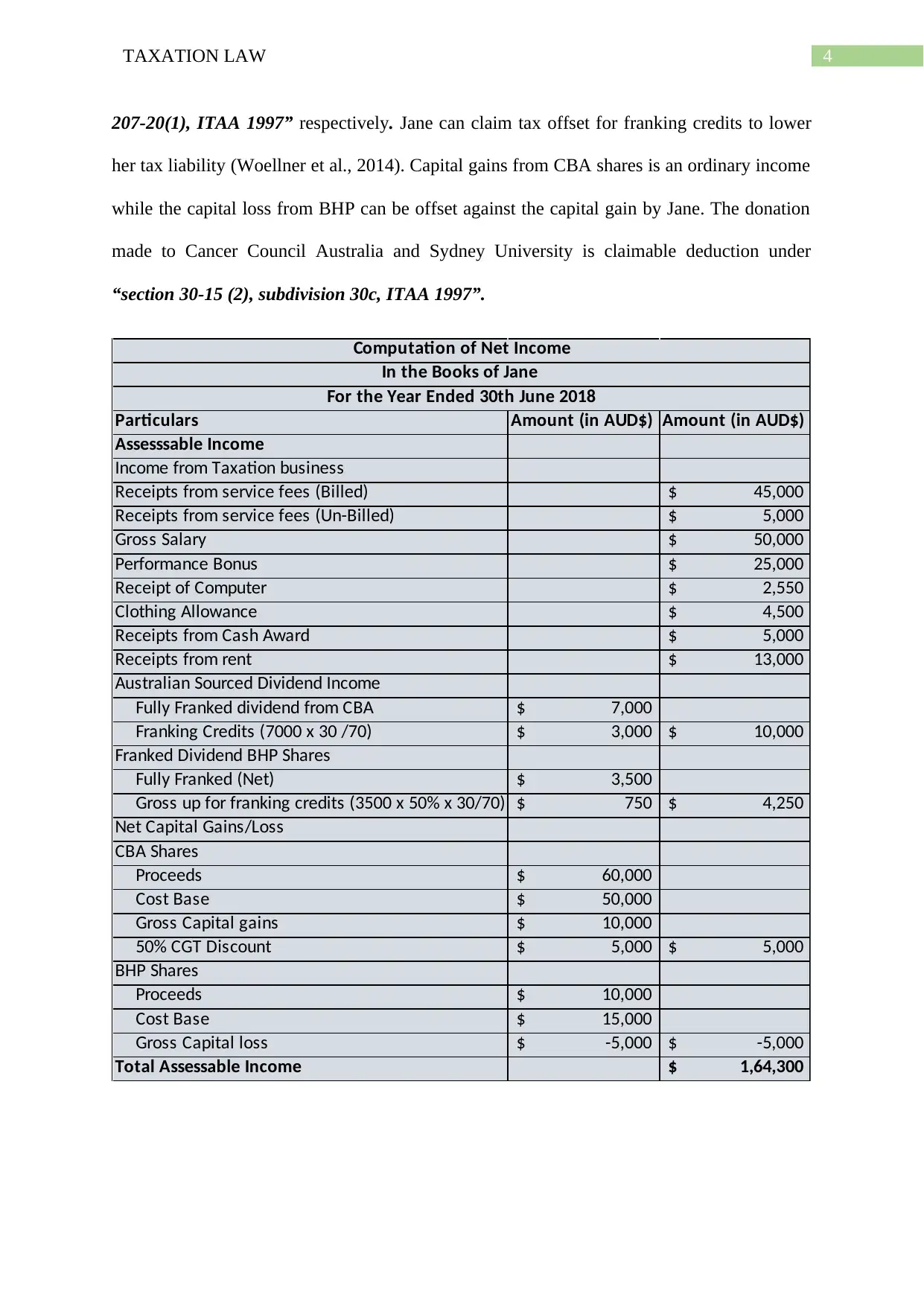
4TAXATION LAW
207-20(1), ITAA 1997” respectively. Jane can claim tax offset for franking credits to lower
her tax liability (Woellner et al., 2014). Capital gains from CBA shares is an ordinary income
while the capital loss from BHP can be offset against the capital gain by Jane. The donation
made to Cancer Council Australia and Sydney University is claimable deduction under
“section 30-15 (2), subdivision 30c, ITAA 1997”.
Particulars Amount (in AUD$) Amount (in AUD$)
Assesssable Income
Income from Taxation business
Receipts from service fees (Billed) 45,000$
Receipts from service fees (Un-Billed) 5,000$
Gross Salary 50,000$
Performance Bonus 25,000$
Receipt of Computer 2,550$
Clothing Allowance 4,500$
Receipts from Cash Award 5,000$
Receipts from rent 13,000$
Australian Sourced Dividend Income
Fully Franked dividend from CBA 7,000$
Franking Credits (7000 x 30 /70) 3,000$ 10,000$
Franked Dividend BHP Shares
Fully Franked (Net) 3,500$
Gross up for franking credits (3500 x 50% x 30/70) 750$ 4,250$
Net Capital Gains/Loss
CBA Shares
Proceeds 60,000$
Cost Base 50,000$
Gross Capital gains 10,000$
50% CGT Discount 5,000$ 5,000$
BHP Shares
Proceeds 10,000$
Cost Base 15,000$
Gross Capital loss -5,000$ -5,000$
Total Assessable Income 1,64,300$
Computation of Net Income
In the Books of Jane
For the Year Ended 30th June 2018
207-20(1), ITAA 1997” respectively. Jane can claim tax offset for franking credits to lower
her tax liability (Woellner et al., 2014). Capital gains from CBA shares is an ordinary income
while the capital loss from BHP can be offset against the capital gain by Jane. The donation
made to Cancer Council Australia and Sydney University is claimable deduction under
“section 30-15 (2), subdivision 30c, ITAA 1997”.
Particulars Amount (in AUD$) Amount (in AUD$)
Assesssable Income
Income from Taxation business
Receipts from service fees (Billed) 45,000$
Receipts from service fees (Un-Billed) 5,000$
Gross Salary 50,000$
Performance Bonus 25,000$
Receipt of Computer 2,550$
Clothing Allowance 4,500$
Receipts from Cash Award 5,000$
Receipts from rent 13,000$
Australian Sourced Dividend Income
Fully Franked dividend from CBA 7,000$
Franking Credits (7000 x 30 /70) 3,000$ 10,000$
Franked Dividend BHP Shares
Fully Franked (Net) 3,500$
Gross up for franking credits (3500 x 50% x 30/70) 750$ 4,250$
Net Capital Gains/Loss
CBA Shares
Proceeds 60,000$
Cost Base 50,000$
Gross Capital gains 10,000$
50% CGT Discount 5,000$ 5,000$
BHP Shares
Proceeds 10,000$
Cost Base 15,000$
Gross Capital loss -5,000$ -5,000$
Total Assessable Income 1,64,300$
Computation of Net Income
In the Books of Jane
For the Year Ended 30th June 2018
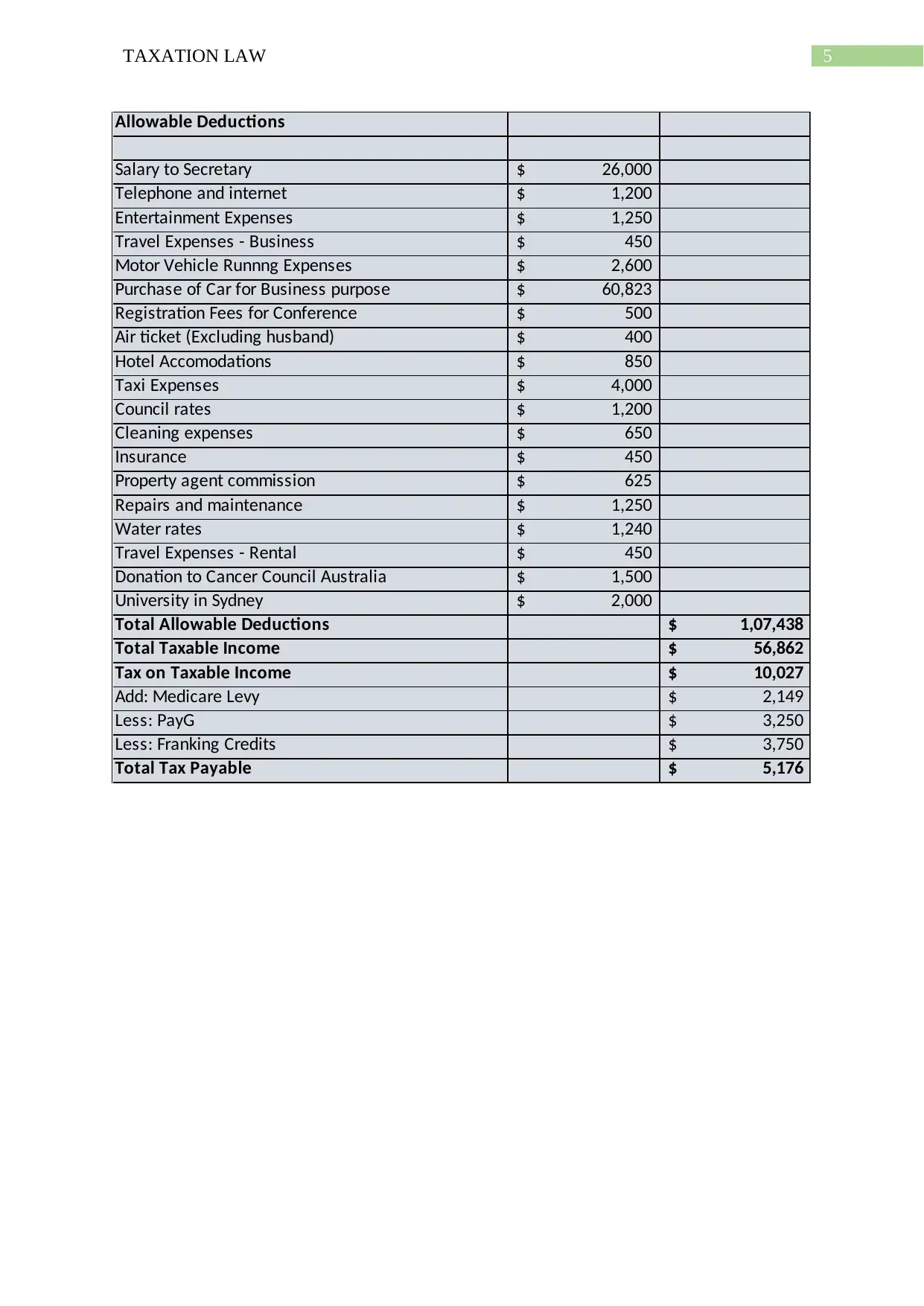
5TAXATION LAW
Allowable Deductions
Salary to Secretary 26,000$
Telephone and internet 1,200$
Entertainment Expenses 1,250$
Travel Expenses - Business 450$
Motor Vehicle Runnng Expenses 2,600$
Purchase of Car for Business purpose 60,823$
Registration Fees for Conference 500$
Air ticket (Excluding husband) 400$
Hotel Accomodations 850$
Taxi Expenses 4,000$
Council rates 1,200$
Cleaning expenses 650$
Insurance 450$
Property agent commission 625$
Repairs and maintenance 1,250$
Water rates 1,240$
Travel Expenses - Rental 450$
Donation to Cancer Council Australia 1,500$
University in Sydney 2,000$
Total Allowable Deductions 1,07,438$
Total Taxable Income 56,862$
Tax on Taxable Income 10,027$
Add: Medicare Levy 2,149$
Less: PayG 3,250$
Less: Franking Credits 3,750$
Total Tax Payable 5,176$
Allowable Deductions
Salary to Secretary 26,000$
Telephone and internet 1,200$
Entertainment Expenses 1,250$
Travel Expenses - Business 450$
Motor Vehicle Runnng Expenses 2,600$
Purchase of Car for Business purpose 60,823$
Registration Fees for Conference 500$
Air ticket (Excluding husband) 400$
Hotel Accomodations 850$
Taxi Expenses 4,000$
Council rates 1,200$
Cleaning expenses 650$
Insurance 450$
Property agent commission 625$
Repairs and maintenance 1,250$
Water rates 1,240$
Travel Expenses - Rental 450$
Donation to Cancer Council Australia 1,500$
University in Sydney 2,000$
Total Allowable Deductions 1,07,438$
Total Taxable Income 56,862$
Tax on Taxable Income 10,027$
Add: Medicare Levy 2,149$
Less: PayG 3,250$
Less: Franking Credits 3,750$
Total Tax Payable 5,176$
⊘ This is a preview!⊘
Do you want full access?
Subscribe today to unlock all pages.

Trusted by 1+ million students worldwide
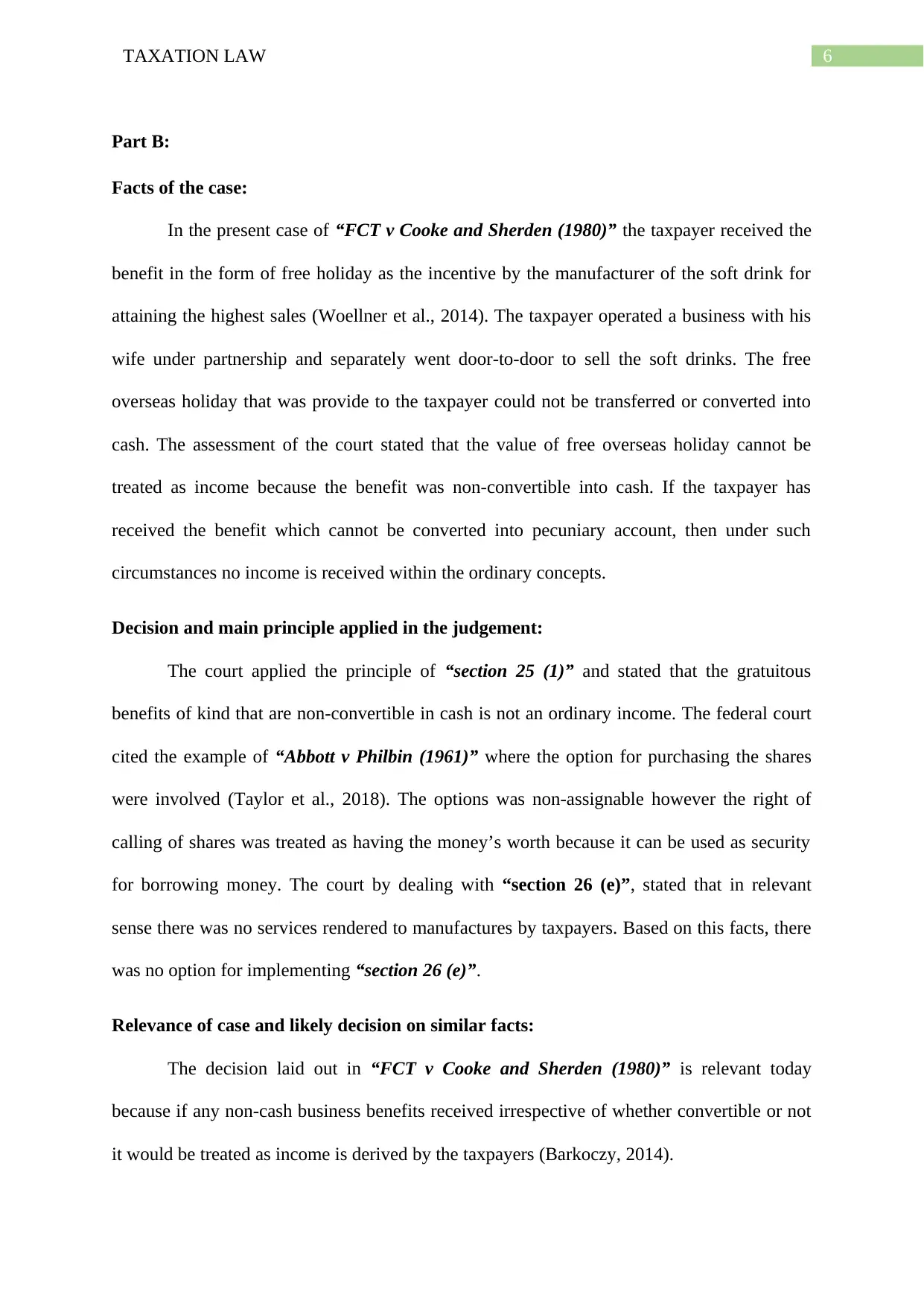
6TAXATION LAW
Part B:
Facts of the case:
In the present case of “FCT v Cooke and Sherden (1980)” the taxpayer received the
benefit in the form of free holiday as the incentive by the manufacturer of the soft drink for
attaining the highest sales (Woellner et al., 2014). The taxpayer operated a business with his
wife under partnership and separately went door-to-door to sell the soft drinks. The free
overseas holiday that was provide to the taxpayer could not be transferred or converted into
cash. The assessment of the court stated that the value of free overseas holiday cannot be
treated as income because the benefit was non-convertible into cash. If the taxpayer has
received the benefit which cannot be converted into pecuniary account, then under such
circumstances no income is received within the ordinary concepts.
Decision and main principle applied in the judgement:
The court applied the principle of “section 25 (1)” and stated that the gratuitous
benefits of kind that are non-convertible in cash is not an ordinary income. The federal court
cited the example of “Abbott v Philbin (1961)” where the option for purchasing the shares
were involved (Taylor et al., 2018). The options was non-assignable however the right of
calling of shares was treated as having the money’s worth because it can be used as security
for borrowing money. The court by dealing with “section 26 (e)”, stated that in relevant
sense there was no services rendered to manufactures by taxpayers. Based on this facts, there
was no option for implementing “section 26 (e)”.
Relevance of case and likely decision on similar facts:
The decision laid out in “FCT v Cooke and Sherden (1980)” is relevant today
because if any non-cash business benefits received irrespective of whether convertible or not
it would be treated as income is derived by the taxpayers (Barkoczy, 2014).
Part B:
Facts of the case:
In the present case of “FCT v Cooke and Sherden (1980)” the taxpayer received the
benefit in the form of free holiday as the incentive by the manufacturer of the soft drink for
attaining the highest sales (Woellner et al., 2014). The taxpayer operated a business with his
wife under partnership and separately went door-to-door to sell the soft drinks. The free
overseas holiday that was provide to the taxpayer could not be transferred or converted into
cash. The assessment of the court stated that the value of free overseas holiday cannot be
treated as income because the benefit was non-convertible into cash. If the taxpayer has
received the benefit which cannot be converted into pecuniary account, then under such
circumstances no income is received within the ordinary concepts.
Decision and main principle applied in the judgement:
The court applied the principle of “section 25 (1)” and stated that the gratuitous
benefits of kind that are non-convertible in cash is not an ordinary income. The federal court
cited the example of “Abbott v Philbin (1961)” where the option for purchasing the shares
were involved (Taylor et al., 2018). The options was non-assignable however the right of
calling of shares was treated as having the money’s worth because it can be used as security
for borrowing money. The court by dealing with “section 26 (e)”, stated that in relevant
sense there was no services rendered to manufactures by taxpayers. Based on this facts, there
was no option for implementing “section 26 (e)”.
Relevance of case and likely decision on similar facts:
The decision laid out in “FCT v Cooke and Sherden (1980)” is relevant today
because if any non-cash business benefits received irrespective of whether convertible or not
it would be treated as income is derived by the taxpayers (Barkoczy, 2014).
Paraphrase This Document
Need a fresh take? Get an instant paraphrase of this document with our AI Paraphraser
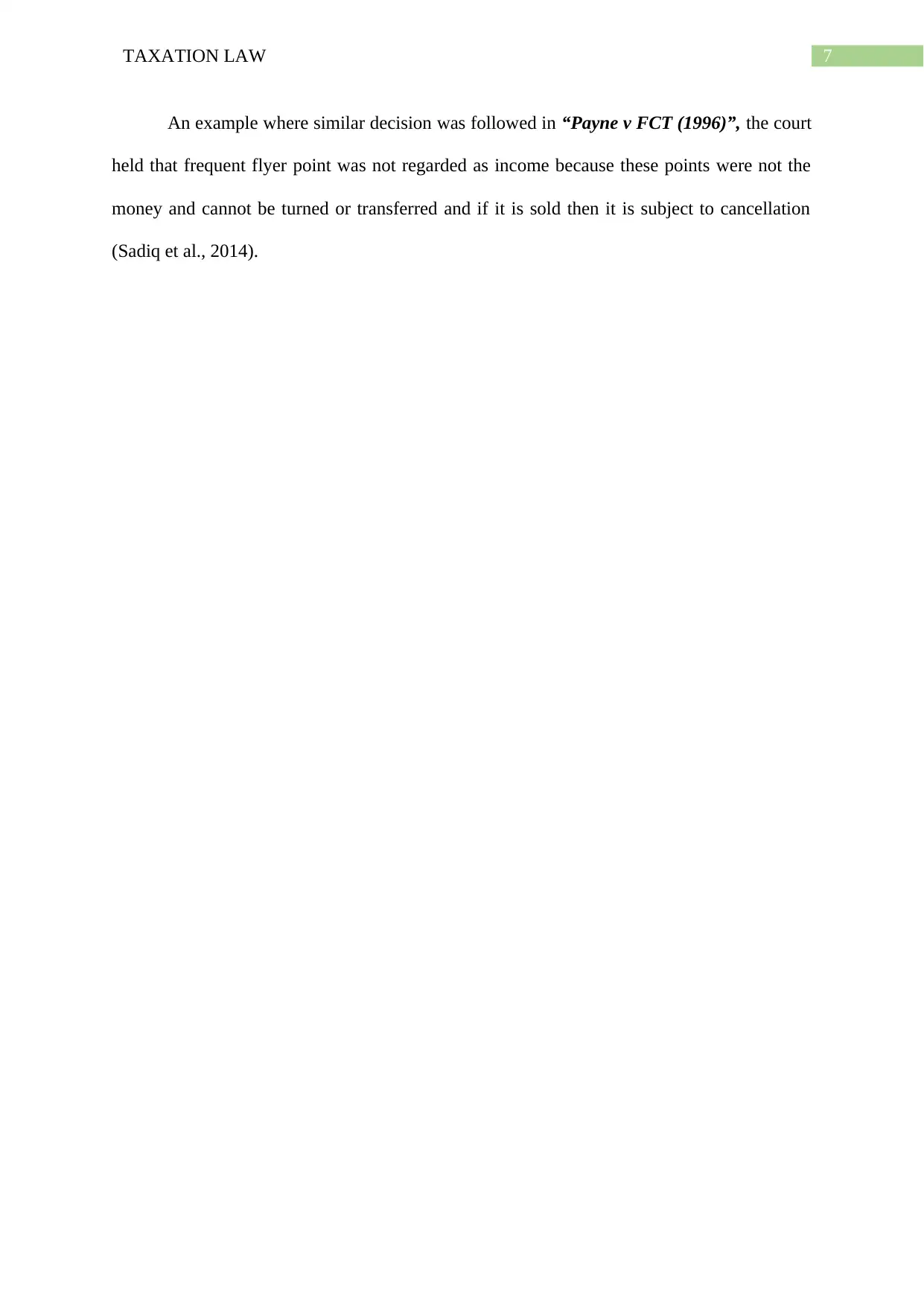
7TAXATION LAW
An example where similar decision was followed in “Payne v FCT (1996)”, the court
held that frequent flyer point was not regarded as income because these points were not the
money and cannot be turned or transferred and if it is sold then it is subject to cancellation
(Sadiq et al., 2014).
An example where similar decision was followed in “Payne v FCT (1996)”, the court
held that frequent flyer point was not regarded as income because these points were not the
money and cannot be turned or transferred and if it is sold then it is subject to cancellation
(Sadiq et al., 2014).
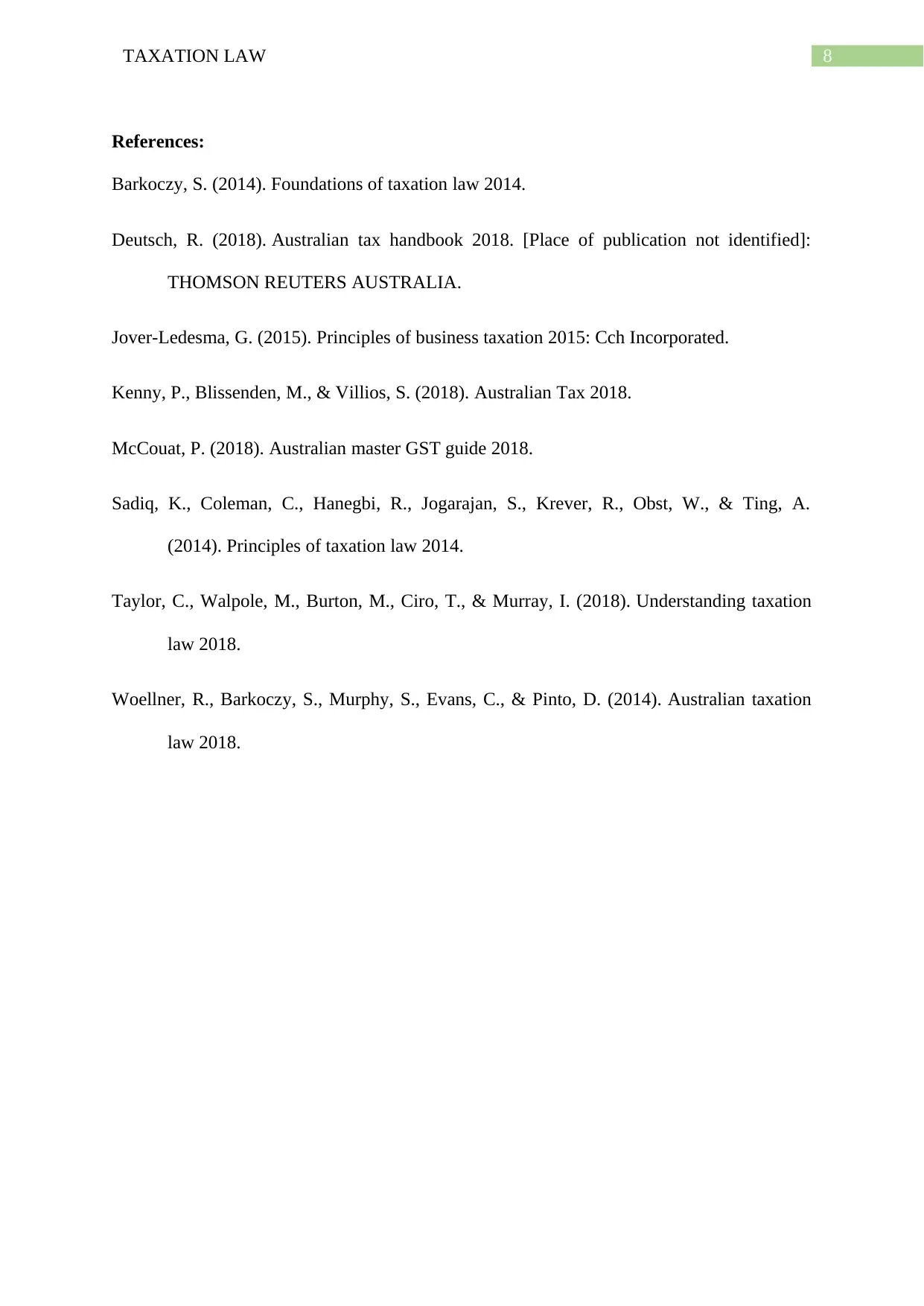
8TAXATION LAW
References:
Barkoczy, S. (2014). Foundations of taxation law 2014.
Deutsch, R. (2018). Australian tax handbook 2018. [Place of publication not identified]:
THOMSON REUTERS AUSTRALIA.
Jover-Ledesma, G. (2015). Principles of business taxation 2015: Cch Incorporated.
Kenny, P., Blissenden, M., & Villios, S. (2018). Australian Tax 2018.
McCouat, P. (2018). Australian master GST guide 2018.
Sadiq, K., Coleman, C., Hanegbi, R., Jogarajan, S., Krever, R., Obst, W., & Ting, A.
(2014). Principles of taxation law 2014.
Taylor, C., Walpole, M., Burton, M., Ciro, T., & Murray, I. (2018). Understanding taxation
law 2018.
Woellner, R., Barkoczy, S., Murphy, S., Evans, C., & Pinto, D. (2014). Australian taxation
law 2018.
References:
Barkoczy, S. (2014). Foundations of taxation law 2014.
Deutsch, R. (2018). Australian tax handbook 2018. [Place of publication not identified]:
THOMSON REUTERS AUSTRALIA.
Jover-Ledesma, G. (2015). Principles of business taxation 2015: Cch Incorporated.
Kenny, P., Blissenden, M., & Villios, S. (2018). Australian Tax 2018.
McCouat, P. (2018). Australian master GST guide 2018.
Sadiq, K., Coleman, C., Hanegbi, R., Jogarajan, S., Krever, R., Obst, W., & Ting, A.
(2014). Principles of taxation law 2014.
Taylor, C., Walpole, M., Burton, M., Ciro, T., & Murray, I. (2018). Understanding taxation
law 2018.
Woellner, R., Barkoczy, S., Murphy, S., Evans, C., & Pinto, D. (2014). Australian taxation
law 2018.
⊘ This is a preview!⊘
Do you want full access?
Subscribe today to unlock all pages.

Trusted by 1+ million students worldwide
1 out of 9
Related Documents
Your All-in-One AI-Powered Toolkit for Academic Success.
+13062052269
info@desklib.com
Available 24*7 on WhatsApp / Email
![[object Object]](/_next/static/media/star-bottom.7253800d.svg)
Unlock your academic potential
Copyright © 2020–2026 A2Z Services. All Rights Reserved. Developed and managed by ZUCOL.





